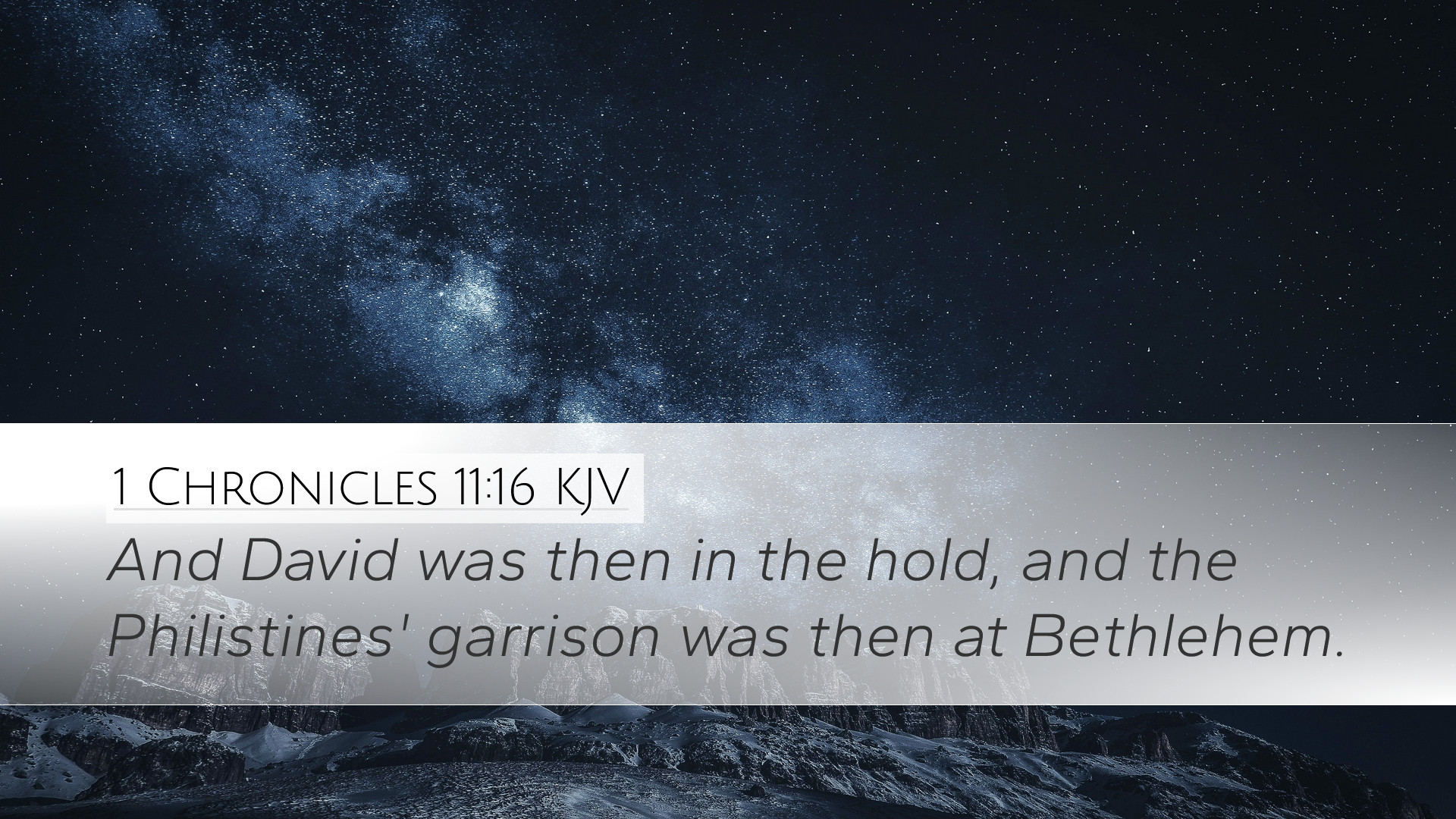Commentary on 1 Chronicles 11:16
Verse Context: 1 Chronicles 11:16 addresses the mighty men of David, particularly focusing on their loyalty and valor in the midst of challenging circumstances. David is in a vulnerable position, surrounded by Philistines who control the city of Beth-lehem, heartily representing the challenges faced by leaders and their followers.
Key Themes
- Loyalty and Valor: The verse underscores the themes of loyalty and courage among David's soldiers, illustrating their readiness to defend their king and their homeland.
- Divine Providence: The passage implies God’s hand in the selection and actions of David's mighty men, emphasizing the divine assistance bestowed upon those who serve faithfully.
- The Nature of Leadership: David's circumstances reveal important lessons about leadership—nurturing loyalty among followers and reciprocating their dedication.
Commentary Insights
Matthew Henry: Matthew Henry highlights the courage of David's men, particularly emphasizing their risk as they ventured into hostile territory for a mere drink from the well, illustrating profound devotion. This devotion serves as an example of how followers honor and serve their leader, reminding pastors and leaders of the importance of cultivating a community characterized by mutual respect and affection.
Albert Barnes: Barnes comments on David's desire for water from the well of Bethlehem, which symbolizes not just a physical longing but emotional longing for home amidst adversity. This metaphor may resonate with those in ministry who seek spiritual nourishment. Barnes emphasizes that David's mighty men undertook an extraordinary act of bravery, which results in a profound reflection on commitment in the face of danger. Their actions demonstrate the extremes to which true loyalty may lead a follower, prompting ministers to consider how they inspire such allegiance.
Adam Clarke: Clarke points out the context of this verse within the broader narrative of David’s rise as king. He notes the implications of their actions, framing it as both an act of bravery and worship; these men were not merely fulfilling a mission but were also expressing their dedication to David, who reflected God’s anointed purpose. Clarke calls attention to the importance of understanding the socio-political landscape in which David operated, providing a rich context for theological reflection.
Application for Leaders and Scholars
This verse bears profound truth pertinent to contemporary leadership within the church and other institutions. It presents several challenges and calls to action:
- Encouraging Loyalty: Leaders are reminded to cultivate vigilantly the loyalty and trust of their followers, knowing that sincere devotion arises from mutual respect and shared values.
- Creating a Sense of Belonging: Just as David’s men fought for him, today’s leaders should foster a community where individuals feel valued and invested in the mission—echoing the biblical principles of unity and shared purpose.
- Facing Challenges Together: Followers are inspired by the leadership demonstrated; thus, leaders must be courageous in leadership roles, especially in trying times that test the community’s resilience and faith.
Theological Implications
This verse invites deeper theological inquiry regarding God’s providential care for His people. The actions of David’s mighty men can be seen as a foreshadowing of the New Testament wherein believers are called to exhibit similar loyalty to Christ and His kingdom.
Mission and Sacrifice: The earnest desire to bring a drink of water to David symbolizes the ultimate sacrifice that Christ made for humanity. Scholars might reflect upon this as they explore themes of sacrifice in the life of Jesus, linking the Old Testament narratives to New Testament fulfillment.
Conclusion
1 Chronicles 11:16 highlights themes of devotion, bravery, and loyalty, providing deep insights for pastors, theologians, and students alike. The powerful image of David's men risking their lives serves as a stark reminder of the commitment required of both leaders and their followers. Through the combined insights of Matthew Henry, Albert Barnes, and Adam Clarke, we see that these themes remain relevant, drawing believers into a deeper understanding of divine purpose and community ethics in their walk of faith.


